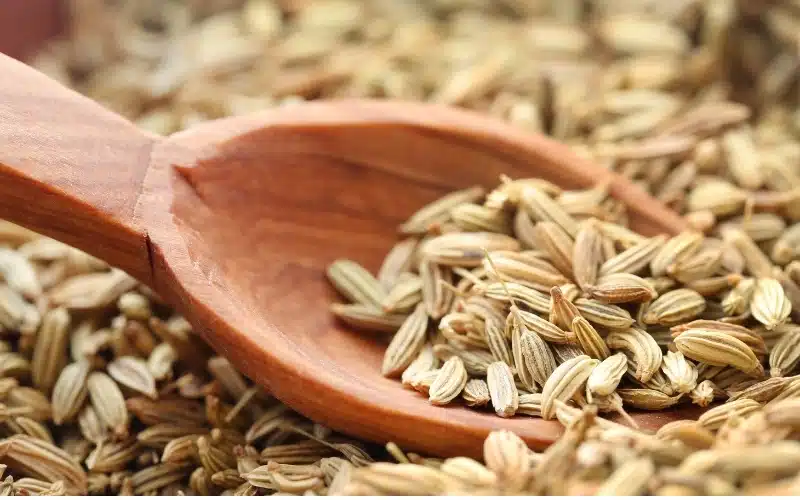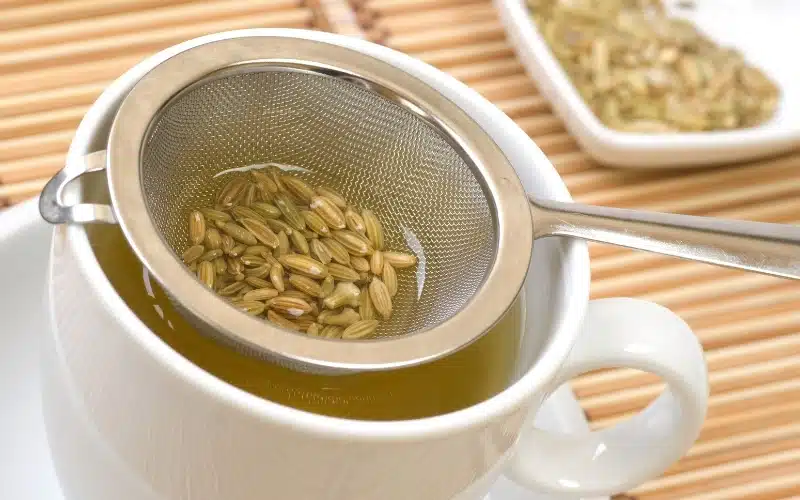Fennel seeds are flavourful spice-based herbs famous for their appetizing and medicinal properties. They are primarily served after meals and offer various health benefits.
Originating from Europe, these seeds are popular as a seasoning in cooking. They can be dried and used to prepare a tasteful aromatic tea.
Benefits of Eating Fennel Seeds During Pregnancy

Fennel seeds have several health benefits. They contain antioxidant, anti-inflammatory, and anti-bacterial properties. However, risks of consuming it in large amounts are associated at all times, especially during pregnancy.
Many pregnant women develop a habit of eating fennel seeds or fennel tea during pregnancy as it helps combat morning sickness. It also helps with bloating.
Nutrient-deficient women usually have a low appetite. In that case, fennel seeds can help increase hunger.
Indigestion symptoms in pregnant women during the gestation period are common. A mixture of fennel seeds with cumin powder can help relieve such problems.
Fennel seeds produce an anti-flatulence effect, relaxing digestive tract muscles and stimulating bile flow. It helps in preventing digestion cramps in the stomach.
The Risks and Side Effects of Eating Fennel Seeds During Pregnancy
Everything herbal is not always beneficial, and this applies to fennel seeds accurately Being a natural emmenagogue, fennel seeds may trigger or increase menstrual flow.
Therefore, you should only take them in small amounts. To avoid adversities, confirm with your doctor the portion of fennel seeds you should take during pregnancy.
The side effects of consuming large amounts of fennel seeds in pregnancy include:
- Excess fennel seeds can make your skin dry and extremely sensitive. Avoid having fennel seeds during pregnancy if you have sensitive skin
- The antispasmodic, anti-inflammatory, and phytoestrogenic properties of fennel stimulate the uterus, leading to premature contractions. However, having it in small quantities throughout the pregnancy won’t harm the fetus or lead to premature contractions
- The uterine stimulation property of fennel seeds makes it difficult for women to control vaginal bleeding when had in excess quantities, which can ultimately lead to miscarriage
- If you are allergic to mugwort, celery, and carrot, you might have an allergic response to fennel
- Fennel affects the ability of your blood to thicken, making the clotting slow. Hence, it is sensible to avoid fennel if you have a bleeding disorder. It also applies to people who are susceptible to bleeding and bruises
Safe Ways to Consume Fennel Seeds During Pregnancy

If your doctor gives you the green check to have fennel seeds during pregnancy, there are a few ways to consume them. It would help if you had them in moderate amounts.
Fennel seeds have a pleasant aroma and are slightly sweet. They work as a flavoring agent and impart a subtle flavor to your food. You can also consume them in tea or chew some raw after a meal.
However, you must check with your doctor or dietician before you include fennel seeds in your pregnancy diet.
Some recipes typically require a small number of fennel seeds, and a small amount is likely not harmful. Avoid having excess amounts.
Does Eating Fennel Seeds Cause Miscarriage?
Many women eat fennel seeds during pregnancy as it helps with digestion. However, consuming them in large amounts could disturb the menstrual cycle. It could lead to vaginal bleeding and, ultimately, an eventual miscarriage.
Fennel Tea

Fennel tea is an aromatic beverage made from the leaves or seeds of the fennel plant. Historically, this herb has been a significant contributor to naturopathic medicine.
Herbalists and nurses recommended fennel tea to treat disorders affecting the female reproductive system holistically.
It is extensively used in modern naturopathy to treat complications of pregnancy and lactation. Fennel tea is beneficial in moderate food amounts, but medicinal doses are unsafe.
Can You Have Fennel Tea During Pregnancy?
Fennel tea helps induce and accelerate childbirth when pregnancy is past due. However, it would help if you only used it under the guidance of an obstetrician.
Theoretically, one should not consume fennel tea in medicinal doses as it may lead to preterm labor. It could also possibly damage the baby’s endocrine system. Hence, it is best to enjoy fennel tea as a beverage once in a while rather than regularly, like medicine.
Other Facts About Fennel Seeds
- Treats stomach upset and bloating
- It helps in curing sore throats and coughs
- Acts as an aphrodisiac by increasing libido
- Supports weight loss by increasing metabolism and suppressing hunger
- Fennel nutrition can pass through breast milk and help the baby cure digestive distress
- Fennel is known as a galactagogue – a compound known to bring more breast milk
- Mothers who go through low breast milk production can consume fennel mixtures regularly to increase their breast milk supply
- Known to have estrogenic properties
- Previously, people used fennel herbs to treat sexual abnormalities in women
- Chewing raw seeds made women perform better in sexual activities
- Fennel seeds with other breastfeeding herbs, such as alfalfa, fenugreek, blessed thistle, and stinging nettle, are better than any lactation supplement
- Avoid taking extra fennel in the form of herbal teas if you are pregnant, or you can make it the only source of fennel intake. Consult your doctor to learn more about things to avoid during pregnancy.
The Takeaway
Apart from the herbal goodness that fennel seeds have, it can also be crushed in a blender, mixed with other spices, and added to curries. Consuming small amounts of fennel seeds during pregnancy will not cause much harm.
Fennel seeds are known to replenish skin and improve joint function. It is best if you could avoid it if you have sensitive skin or your pregnancy symptoms have resulted in developing sensitive skin since the onset. Consume them on medical advice only.

